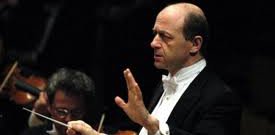On 27 December, I had the pleasure of seeing / hearing the “secret”. A wonderful atmosphere, colourful programme and high quality. Since the concert not only summarised the orchestra’s latest season but also pre-empted the next one, it should be mentioned here that reports on the BFO led by conductor Iván Fischer contained numerous superlatives this year (too). It is not by chance that I highlight the leading conductor since opinions are often divided as to guest conductors and invited soloists, but never with regard to Iván Fischer. (Even in connection with
The Red Heifer, it was not his conducting career that stern critics dissected.) The whole year was just another section of the BFO’s unrelenting triumphant march. Cooperation agreements with world-leading music institutions, charity concerts, marathons, concerts for little children and adults... There is no question but that the musicians love to “work”, as several reviews reveal, but executive director Stefan Englert claims they even have the wherewithal, which is indeed newsworthy. So the Festival Orchestra is successful and can be relied on. But this means the “secret” has something to do with the programme. Or did it?
Jumping to conclusions, one thing did transpire that evening: it is not the conductor, but Iván Fischer himself who is the BFO’s secret component. Audiences and his own musicians are charmed and energised by his charisma, versatility, creativity and professionalism. When Iván Fischer is present, the excellent musicians’ skills add up to one of the best orchestras in the world. The Surprise Concert visually helped with this realisation. In addition to the grand stage of the Budapest Congress Centre, a smaller stage was also set up in the midst of the audience. While the former was rearranged, chamber music was usually performed on the latter, featuring productions that nearly received awards at the orchestra’s in-house Sándor Végh competition and compositions usually played at Cocoa Concerts – but only as an intermezzo. Performances on the grand stage enjoyed enormous success, but not because of the number of participants. There were some unique moments during the chamber music performances too: Ákos Ács, for example, played very well, sensibly and diversely. (
This was not the first time I was impressed by his play...) Unlike his fellow chamber musicians, he did not appear nervous at all, which would otherwise be attributable to leaving the orchestra for a soloist production. He did not exchange the “obligatory” nod with fellow chamber musicians, and more importantly, he did not want to prove anything or meet anybody’s expectation. He imagined every single sound carefully and produced them perfectly. He was both immersed in his own musical world and carefully watched his music partners, whilst continuously adapting.
Let there be no mistake, all the orchestra members played very well in the chamber productions, but they seemed to want too much and be too harassed or even uncertain. But as soon as they were conducted by Ivan Fischer, the very same instrument or musician played even better and in a more memorable and unique manner. While Fischer amazed the audience minute-by-minute with stories like taking young talents under his wing, expressly emphasising the importance of general music education (with the help of the bassoon ensemble entitled “Ormányos Falka” featuring about twenty children), performing free concerts to villagers and recruiting choir members from his orchestra, i.e. while sharing his fabulous good deeds, his fine words were consistently underlined with valuable music until the last interval.
No fussing or theatrical movements. I can’t help but mention every time that particular subtle movement Iván Fischer makes in order to create utter silence (even in the audience!) after a composition ends. This time at the Surprise Concert I was enthralled by the other end of the pieces, i.e. the precise and perfect starts. Both the concert-opening
Academic Overture by Brahms and – especially – the Scherzo from the incidental music of
A Midsummer Night’s Dream were performed with impressive resoluteness. This kind of confidence characterised every interpretation conducted by Iván Fischer. The March of the Priests in
The Magic Flute was sublime, the “
The Bartered Bride” overture (by Smetana) was playful, while “
The Firebird” suite by Stravinsky was impressive. The conducting movements did not matter, unlike the enthusiasm and the expression of
being immersed in the music. There is fire and light in Iván Fischer’s eyes, which makes the flutes sing and, like a bird, carry the message of the music. Cheesy or not, I cannot find any other explanation as to how an orchestra led by its own conductor is always able to do miraculous things, but be criticised occasionally when there is a guest conductor. Brilliant Fail-Safe Orchestra: BFO.
It was not only the Festival Orchestra which was brilliant that evening. The accurate and well-prepared live broadcasting we saw on the screens is quite unusual given how classical music is normally seen on TV. It was a pleasure to see the given soloist playing on their instrument on time; the picture was a worthy partner, supporter and part of the music. Going back to the initial thought, Iván Fischer is the open secret of the BFO – I didn’t just expose the secret now. The concert was not disappointing, it was not an unexpected surprise. And music lovers are keen to be part of such secrecy.


